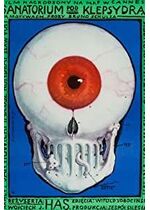-
Jayne 2022-12-28 03:28:35
imagery of the Holocaust
Bruno Schultz's "The Sanatorium with the Hourglass as a Signboard" in "Alligator Street" is the original text of this film. Although there are some discrepancies between the film and the book, I think that after reading it, the doubts should be cleared up. My personal understanding is that the...
-
Alexys 2022-10-27 13:37:14
nostalgia
A hat, a candle, a train... This is the image of a conductor and an extradition person. In Tarkovsky's "Nostalgia", there is a very long shot. The protagonist holds a candle and protects the candle from one end to the other again and again... There is a legend in this that as long as the candle...
-
Lowell 2022-10-14 11:48:07
backtracking
On the train to the sanatorium, every passenger is silent and lifeless. This is a journey to death, and it seems the most appropriate ritual for people to retrace their lives before death. In the film, the man who got off the train and came to the spooky and dilapidated nursing home was looking for...
-
Javon 2022-10-09 08:30:59
absurd anti-war fairy tale flyer
Seeing it in the end, it seems that I understand it in a fog. too fly. Space and time are double warped. Anti-war means obvious. Stories take place under conditions where people can interfere with time. The male protagonist is a reflective person, an anti-warrior and a revolutionary at the same...
-
Dessie 2022-10-07 14:44:25
esoteric training in esoteric training
In 1973, "Sanatorium under the Mirror of Sand Time" is the most bizarre and beautiful work of Polish director Wojciech Haas. Haas's ambition is obviously not only to visualize the few short stories of Bruno Schulz, the literary master, but to combine and gather Schulz to try to summarize and...
-
Jess 2022-10-04 22:24:21
Death Train and Time Black Hole
Random notes: the main line of looking for the father, the multi-linearity of time and the view of life and death (the connection and memory of the world after death) with the film analysis of the memory of the father and the various fragments of his life, the disappearance of the memory before...
-
Roslyn 2022-10-01 21:51:39
Bruno Schultz's film adaptation: "The Hourglass as a Signature Nursing Home"
Adaptation from novel to film is not a parallel transplant, but a translation - it involves the transformation of media, grammar, and the old problem of information that is visible in one style becoming invisible in another . After all, words rely on imagination, while movies are mainly used to...
-
Gerhard 2022-10-01 02:13:46
Sanitarium under the sand mirror review
Quick knife prodigal son translation is not a prodigal son Three reincarnations: the nurse, the doctor, the father, the boy with glasses, the mother, the two dogs, the other self, the sleeping man, the gang of Jews, the orange-haired young woman, the mustache eating honey under the bed , postman,...
-
Alexandrine 2022-09-17 16:07:01
Have you heard the "time can't change" story?
This 1973 release of "The Sanatorium under the Mirror of Sand Time" has bizarre scenes, delicate and full pictures, beautiful and beautiful, and focuses on the concept of time and space shuttle. As long as you live in this "hourglass" nursing home, you can go back to the past and travel through a...
-
Elouise 2022-09-16 05:15:51
Articles from public accounts written in a mess
is a 1973 adaptation by director Wojciic Haas from the novel "The Hourglass as the Signboard of the Sanatorium" by the Polish Jewish writer Bruno Schultz, hereinafter referred to as "Hourglass". Schultz is undoubtedly a master of surrealism, and his works are full of countless fantasies and...
- Comedy Movie Reviews
- Action Movie Reviews
- Romance Movie Reviews
- Thriller Movie Reviews
- Crime Movie Reviews
- Animation Movie Reviews
- Horror Movie Reviews
- Adventure Movie Reviews
- Fantasy Movie Reviews
- History Movie Reviews
- Documentary Movie Reviews
- Western Movie Reviews
- Drama Movie Reviews
- War Movie Reviews
- Musical Movie Reviews
- Family Movie Reviews
See More
Less
The Hourglass Sanatorium Reviews
Director: Wojciech Has
Language: Polish,Yiddish,Hebrew,Latin Release date: December 12, 1973

